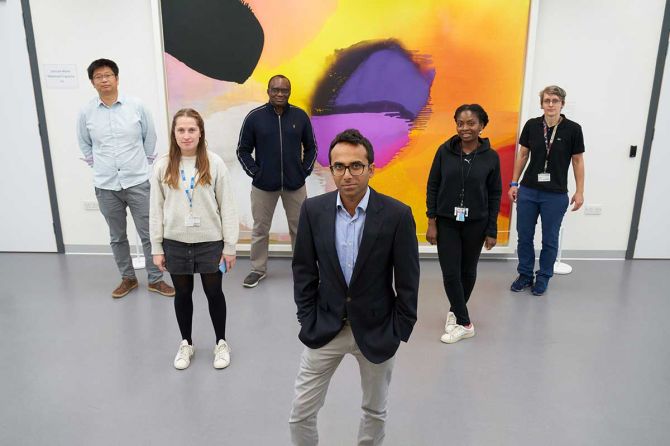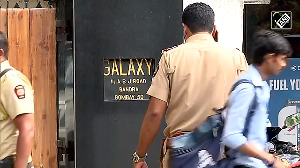'The most intriguing thing (about COVID-19) is the range of the illness -- from asymptomatic or less symptoms to death and quite severe manifestations.'
'The vaccine will be at least another year away from having any effect.'

"We will overcome this," calmly assures Professor Ravindra Kumar Gupta when asked about COVID-19.
Those are extraordinarily valuable words.
Why?
They are coming from a man and a healer who treated another disease said to be untreatable.
And struck a deadly blow against another of the world's most feared viruses.
They are coming from a man who knows Medicine can and will always finally conquer.
Professor Gupta, a physician and infectious disease and public health specialist, toiled more than five years to 'functionally cure' the London Patient, only the second other person cured in the world of the deadly HIV.
He recently received a citation from Time magazine who placed him on their 100 Most Influential People 2020 list.
Professor of clinical microbiology at the Cambridge Institute of Therapeutic Immunology and Infectious Disease, the London-raised Professor Gupta, who is married to a surgeon and has three children, feels it important to mention that he is an Overseas Citizen of India.
He is a product of Cambridge, Oxford and Harvard -- he studied medicine at Cambridge, earned his clinical degree and later gained his infectious diseases training from Oxford.
His master's in public health is from Harvard School of Public Health and his PhD in virology from University College London.
He is also attached to the Africa Health Research Institute in Durban, South Africa.
In Part II of his interview to Vaihayasi Pande Daniel/Rediff.com Professor Gupta talks about the progress of the Samba II machine that he and his team have devised for rapid testing for COVID-19 in hospitals and about how the COVID-19 virus may the first in a horde of viruses we might face in years to come.

From your point of view what is the most intriguing or scary thing about COVID-19?
The most intriguing thing is the range of the illness -- from asymptomatic or less symptoms to death and quite severe manifestations.
Of course, all diseases can do this.
Either be mild in some people and lethal in others.
The sheer scale of the spread has been remarkable -- for the sheer numbers of people, it is very big.
So that's one thing -- just the range of disease.
But also, the multi-symptom aspect, which we discussed, the fact that it affects different organs, the fact that it causes blood clots. You know, what is that?
Understanding the inflammatory immune response to the virus, I think is the key -- what are the conditions created by this viral infection that make you have blood clots or make your immune cells go crazy and why does it happen in some people and not others.
I think it is a very, very interesting virus for many different reasons.

Everybody realises how dangerous the virus is.
At the same time, they know that COVID-19 is going to go on for a long while.
And we cannot forever sit in our safe bubbles and must venture out.
But it still is a very bad situation and this lull not so good?
The key thing is that we need to accept that there is a risk of getting the virus and try to move on with life, but at the same time protect yourself and others -- mask wearing, hand washing, distancing, limiting gatherings.
We need to carry on doing that, while trying to kind of go back to business as it were.
It is difficult to understand people's calculation of risk benefit.
So, people have different levels of risk, and also, some people need to survive and to feed themselves and will need to do things.

What is the kind of work you plan to do on COVID-19 given that you would continue to work on HIV too?
I understand that Samba II that you and your team devised is in testing phase.
We'd like to do both, side by side, as much as we can, because there are still questions to answer.
A lot of the work we're doing has relevance for both viruses anyway.
One is the genetic evolution of the virus.
So, we're using the same techniques to understand these things with HIV and coronavirus (SARS-CoV-2).
In terms of the Samba test, a rapid test was one of the big needs we saw in the hospital.
We took a platform which was used to monitor the London Patient, and we adapted it for the coronavirus (SARS-CoV-2).
Now the hospitals have changed to using Samba alone.
And the NHS (Britain's National Health Service) has been buying these machines to, to use in different hospitals and other institutions.
The limitation is the sheer number of machines required and tests required.
So, we are still having to use multiple different testing strategies.
We did a lot of the groundwork behind this.
We also showed (in a paper published) that the Samba machine was as good as the laboratory testing, and that it had a big impact on patients, basically, in hospitals.
(In a second paper) we showed that after a while the swab test becomes negative in people when they are ill for more than 10 days.
And then you need to test for antibodies after that 10 days to make a diagnosis.
And we validated some points of care like fingerprint blood test for antibodies.
And we show that if you combine swab testing with antibody testing, then you can make a very accurate diagnosis for your patients, who are coming in with the illness.
How expensive is the Samba machine?
The machine itself is about US $25,000 and the cartridge is about US $35 each.
That's per head?
Yes. But we are looking at things like pooling samples from different patients into one cartridge to divide the cost by four.

This SARS-CoV-2, which causes COVID-19, is quite a bit like SARS-CoV, the first SARS virus.
It seems like in the future, the viruses that are going to keep world much more at ransom are going to be coronaviruses?
That certainly seems to be the trend recently.
People were worried about influenza for a long time and it's still a big threat but coronaviruses seems to be causing (bigger) problems and so that's why research into them is kind of quite important.
Even if we do something about this one, there may be another one just around the corner.
We need to investigate them for the longer term.
In a sort of simplistic way would you by quantify the threat COVID-19 poses to world now in comparison to what HIV posed when it came along?
It's a very difficult comparison to make because, of course, with HIV the timing was differen.
It was slower transmission.
This is happening much more quickly.
Coronavirus (SARS-CoV-2) is causing ten times more damage to the global economy and global people than HIV did, of course.
But it doesn't mean that we should forget one and not the other because of all the things we learn from HIV are now being applied to coronavirus (SARS-CoV-2).
Coronavirus (SARS-CoV-2) research would be much, much further behind if it wasn't for the HIV research that was done.
So, which is scarier basically?
I think COVID-19 is five times, ten times scarier.
The Time magazine gave you a citation and put you on their list 100 most influential people in 2020 for curing the London Patient.
What was the most satisfying aspect of that work?
Well, of course, there was the individual, who was facing a death sentence from lymphoma.
And then the HIV was a continual problem for him.
And being able to see that he's overcome both of them, with whatever happened, is amazing.
And but also for the community, the HIV community thing -- all the scientists come together to achieve that -- a lot of collaborative effort with different people around the country and in Europe, based on structures that had been set up for more HIV cure research.
So, I'm very grateful for that.
That was very satisfying to be part of an international collaboration, to really do the best science.

As a doctor and microbiologist, you are viewing COVID-19 from a very different kind of place and in an interesting way.
So, what are the kind of thoughts that sort of cross your mind about this COVID-19 situation or the way this pandemic is progressing, and threatening the world?
My outlook is that we will obviously overcome this.
But it will take time.
The vaccine will be at least another year away, I think, from having any effect.
We will have to live with it for another year.
I think, we will be in continual kind of semi-lockdown and semi restrictions on people's movement and behavior, and we will learn to live with it.
And the economy will have to recover.
And let's hope we can limit the number of deaths.
It's going to be a number of years?
I think we will be dealing with it for another two years at least.
Feature Presentation: Ashish Narsale/Rediff.com












